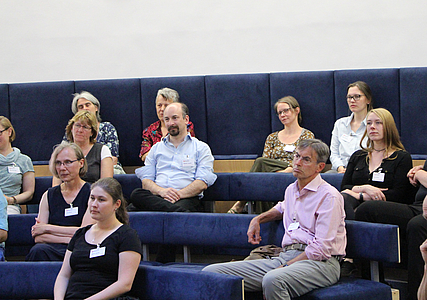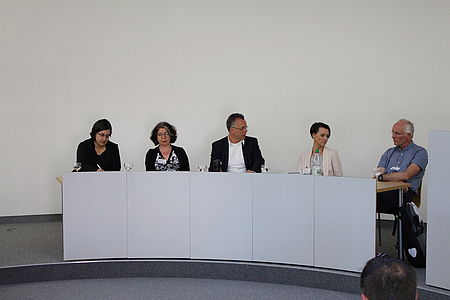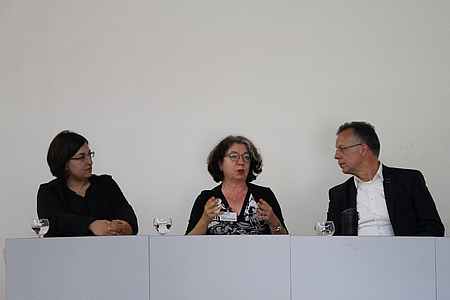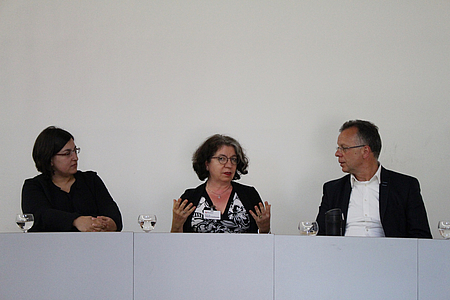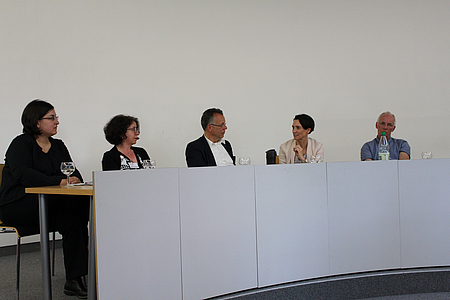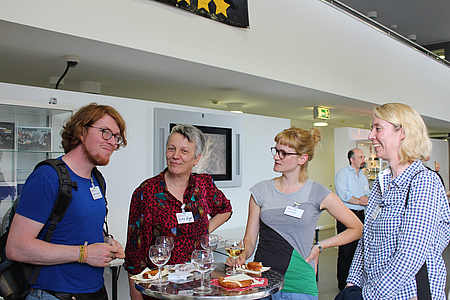Discussion: ‘Inclusive Schools in the Migrant Society’ on May 23, 2018
The discussion held in the modern atmosphere of the Cartesium at the University of Bremen was very interesting, highly topical, and well-attended. Alumna and senator Dr. Claudia Bogedan, alumnus and school principal Carsten Dohrmann, Prof. Dr. Yasemin Karakaşoğlu, and alumna Prof. Dr. Natascha Korff gave insight into this topic – our board member Christoph Sodemann chaired the discussion.
The idea of providing a school for everyone – is it a realistic one? The lack of sufficient qualified personnel, the difficulties of recognizing talents on a second glance and supporting them accordingly, and the limitations of diagnostics question this – in theory, within the political framework, and in practice. In times of a migrant society, the strain increases as do high aspirations – however, possibilities and resources usually do not or not increase at the same time. More language support is needed – and it cannot be expected anymore that students get sufficient help at home. What are we lacking? Are current students prepared adequately for this situation?
Many of these and more questions were discussed in detail and in different professional contexts. Some practical examples from elementary schools were also presented – and how to creatively and appealingly approach topics with the help of a great network of colleagues and strong partners from industry and society. ‘Multi-professional team’ was a major key term for this solution. Prof. Dr. Korff’s hope is to be able to focus more on diversity and be more sensitive with a soft term for inclusion. Therefore, administrative tasks should – if possible – be outsourced, so that teachers can concentrate better on their main field of tasks.
The current job description, however, often stands in the way of that as Dr. Bogedan noticed. ‘Legislator’s budgetary corset’ was the term she used to describe her dilemma between recognition, willingness, and actual change.
Prof. Dr. Karakaşoğlu voiced the much needed vision for a new structure. According to her, an entirely new system has to be found because transnational schools are now the normality, not just a strange manifestation in a few places.
Dr. Bogedan saw location determination as a precondition for making the interests of children and families the main focus again. Most things cannot be changed quickly – however, this should not prevent anybody from acting now. Carsten Dohrmann emphasized that parent-teacher conversations are as important as diagnostics, the clear perception of the status quo, and strong, competent role models.
After the round table, he further explained that his school in Bremen-Kattenturm started cooperating with the WIN (life in the neighborhood) support program of the Quartiermanagement (‘quarter management’). Making contacts, fundraising, and continuous conversations with colleagues from his own and other schools are a vital asset to this approach. Ultimately, trust and contacts have newly created the school’s structures. His guiding principle is to not simply implement what is ordered from above but to find creative solutions locally. That includes picking up ideas from other federal states. Therefore, along with Hamburg and Berlin, Bremen often takes a pioneering role. The system of combining volunteering agencies, reading aids, and retired colleagues guarantees having engaged people in the vicinity and thus more flexibility. According to Dohrmann, practical people are seen completely different in schools. He finds that these ideas and approaches are good and really change something. Similarly, he believes that language support projects such as ‘Family Literacy’ can achieve great results.
The lively discussion, relevant questions, and the ensuing time for networking made the event a successful and highly topical one.
Author: Manuela Brocksieper



